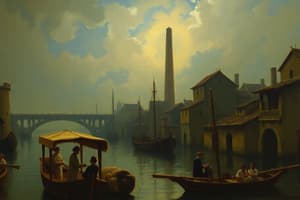Podcast
Questions and Answers
Who were the first Europeans to land on the African coast?
Who were the first Europeans to land on the African coast?
- The Dutch (correct)
- The Portuguese
- The Spanish
- The British
What was the name given to Ghana by the Portuguese due to its abundant resources?
What was the name given to Ghana by the Portuguese due to its abundant resources?
- Ghana Coast
- Emerald Coast
- Gold Coast (correct)
- Ivory Coast
Which country took over the Portuguese forts in Gold Coast after the Dutch-Portuguese war?
Which country took over the Portuguese forts in Gold Coast after the Dutch-Portuguese war?
- Sweden
- Norway
- Britain (correct)
- Denmark
What year did the Berlin Conference, which partitioned Africa, take place?
What year did the Berlin Conference, which partitioned Africa, take place?
What policy did the British practice in their colonies in Africa?
What policy did the British practice in their colonies in Africa?
Which European country built Cape Coast Castle in 1653?
Which European country built Cape Coast Castle in 1653?
What goods did Africans typically exchange in trade with Europeans?
What goods did Africans typically exchange in trade with Europeans?
Which of the following countries was NOT involved in the Berlin Conference?
Which of the following countries was NOT involved in the Berlin Conference?
Flashcards
Who were the first Europeans in Ghana?
Who were the first Europeans in Ghana?
The Portuguese were the first Europeans to land on the African coast, establishing settlements like "da Mina" (Elmina Castle) in Ghana. They traded for gold and established forts which became a center of trade in the region.
Who took over the Portuguese forts in Ghana?
Who took over the Portuguese forts in Ghana?
The Dutch conquered the Portuguese forts in Ghana in 1642 after defeating them in the Dutch-Portuguese war. They continued to trade for goods like gold and controlled the coast for a period.
Who eventually colonized Ghana?
Who eventually colonized Ghana?
The British eventually took control of Ghana's forts from the Dutch, expanding their influence over West Africa. They established a significant presence in the region, setting the stage for eventual colonization.
What was the Scramble for Africa?
What was the Scramble for Africa?
Signup and view all the flashcards
What was the Berlin Conference?
What was the Berlin Conference?
Signup and view all the flashcards
What kind of trade did Europeans establish in Africa?
What kind of trade did Europeans establish in Africa?
Signup and view all the flashcards
What was the British indirect rule policy?
What was the British indirect rule policy?
Signup and view all the flashcards
What were the main trade goods exchanged in Africa?
What were the main trade goods exchanged in Africa?
Signup and view all the flashcards
Study Notes
Colonial African History
- The Portuguese were the first to land on the African coast in 1471, led by Prince Henry.
- They named the region they arrived at the Gold Coast due to abundant gold found along the shore and in rivers.
- The first castle in Africa, "da Mina" (meaning "The Mine"), was built in 1482 in present-day Ghana.
- The castle served as a warehouse and a place of residence for the Portuguese.
- The Dutch took over the castle in 1642 after defeating the Portuguese in a war.
Europeans in Africa
- Various European powers established trading posts and settlements in Africa.
- The Dutch, Swedes, Danes, and British also established forts and castles in Africa, and this resulted in the Scramble for Africa.
- The Dutch, in their occupation of the Gold Coast, eventually found it unprofitable and handed over their forts to the British.
- The Swedes built Cape Coast Castle in 1653, which was subsequently captured by the Danes and then by the British.
- The Danes established the Christiansborg Castle in 1661 in Accra.
History of the Europeans that Occupied Ghana Before Independence
- The Dutch held significant posts in modern-day Ghana but found these unprofitable.
- The Swedes built Cape Coast Castle, but it was taken by the Danes and later the British.
- The Portuguese had occupied territory before them.
- The Danish Christiansborg Castle was sold to the British.
- The Portuguese, Prussian/German, and British also established their settlements.
- The British colonized Ghana between 1867-1957.
Trading Activities
- Europeans traded guns, gunpowder, biscuits, beads, cloth, mirrors, knives, alcohol (gin, rum, schnapps), and chocolates with Africa.
- Africans traded enslaved Africans, gold, bauxite, ivory, salt, palm oil, cocoa, rubber, diamonds, and kola nuts.
Scramble for the Partitioning of Africa
- Europeans competed for territories in Africa.
- The Berlin Conference (1884-1885) involved 14 European nations (Great Britain, France, Germany, US, Sweden, Portugal, and Belgium) to divide Africa among themselves.
- No African representatives were present at the conference.
- The partitioning had adverse effects on Africans.
British Policy of Indirect Rule
- Great Britain controlled a large portion of African territories.
- The "indirect rule" policy relied on existing local governance structures (chiefs, kings) to manage colonies.
- In areas without established leadership, the British appointed a leader.
- The British policy created an imbalance in the development of colonized areas.
French Policy of Direct Rule
- France controlled a portion of African territories.
- The "direct rule" policy involved a more centralized system of governance and French administration.
- Assimilation was a key part of their efforts—they wanted the people to follow European ways.
- This led to an imbalance in the development of colonized areas.
Group Assignments
- The document outlines various assigned topics for different study groups, focusing on specific colonial periods in various African locations.
Studying That Suits You
Use AI to generate personalized quizzes and flashcards to suit your learning preferences.




